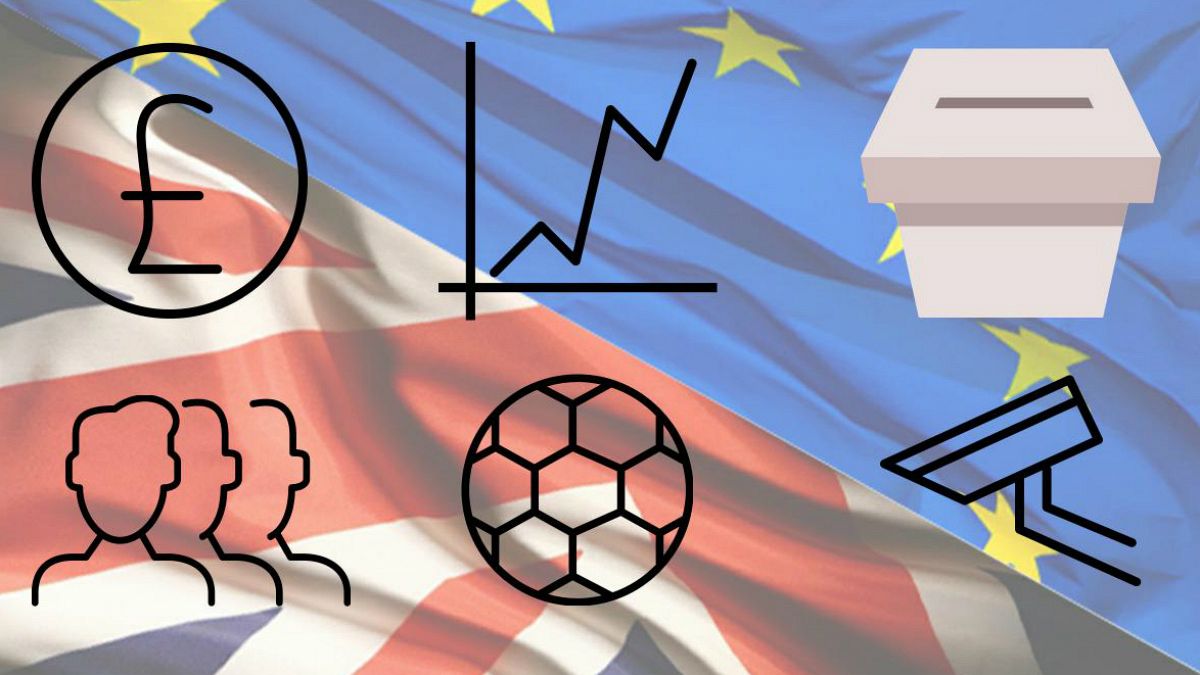As Brits get ready to vote in a referendum that will change the fate of their country on the 23rd of June, we examined what a “Brexit” would mean for
As Brits get ready to vote in a referendum that will change the fate of their country on the 23rd of June, we examined what a “Brexit” would mean for the United Kingdom as well as for the European Union. While Eurosceptics argue that leaving the EU would allow the UK to gain back control of its borders, and remove unnecessary regulation, Europhiles believe that the EU framework supports the British economy and common markets create opportunities for UK businesses.
In this series of infographics, we have visually tried to explain the main stakes of Brexit in the areas of:
- Commerce
- Finance
- Politics
- Migration
- Agriculture
- Security
Commerce
The Eurosceptic camp believes that by withdrawing from the EU, the UK would free itself from the intricate European market regulations and open itself to other trade partners. Meanwhile those that oppose the idea of leaving the EU claim that a Brexit would shut the UK out of its most important trading market as well as from other special trade deals like TTIP with the US that is currently under negotiation. If the UK cannot agree on a special trade deal with the EU, then all EU commercial treaties would cease to apply to Britain. That means that the UK would have to renegotiate trade agreements with union members, with member countries of the European Economic Area, and non-European countries. But the consequences will not only impact the UK: Britain is a major source of demand for the EU. According to a report made by Global Counsel, trade with the UK exceeds 1% of GDP for the Netherlands, Poland, Czech Republic, Belgium, Hungary, Latvia, Lithuania, and Slovakia. The UK is also an important bilateral trading partner with many Irish firms exporting into British supply chains.
Finance
Considering only trade overlooks one of Britain’s most important sectors. UK is the largest recipient of FDI in the EU. Europhiles fear that Brexit could reduce the attractiveness of the UK as a gateway to Europe and lead to a reduction in investment from the rest of the EU. Future investments would be at risk if companies ran into obstacles for conducting business in the UK like visa requirements for foreign workers and barriers to entry into the European market. But London has many advantages that would make it hard for international headquarters to move to another European city such as language, favourable regulation, and a skilled workforce. .
Politics
In the area of politics, a Brexit would mean that the UK would be disconnected from EU market regulation and so would be able to liberalise even more if it wishes to. However, it would lose the right to influence EU policies in areas of interest like foreign relations and economics. As for the EU, without Britain, the balance of power could shift, potentially altering the social and economic policy direction. A Brexit could also embolden other European nationalist parties such as the National Front in France and Germany’s Alternative für Deutschland to rally for their own referendum.
Domestically, a Brexit would weaken and potentially split the Conservative party. A Council on Foreign Relations report on the debate over Brexit, states that Cameron has staked his political future on the UK remaining in the EU even if half of his Tory party, including several of his cabinet ministers such as Justice Minister Michael Gove and Employment Minister Priti Patel support the Leave camp. Others fear that leaving the EU would give the pro-European Scottish nationalist party an excuse to call for a second referendum on independence.
Migration
Migration is one of the most contentious parts of the debate. If the UK leaves the EU then European residents will lose the right to work and live freely in the UK and vice versa. The number of EU migrants in the UK nearly tripled between 2004 and 2015 from about one million to three million after Poland, Bulgaria, and Romania joined the union. Eurosceptics claim that uncontrolled immigration from the EU is negative and blocks skilled immigration from non-EU countries. But the Remain group believes that leaving would not reduce immigration.
Agriculture
Another major impact for the UK if it left the EU would be the end of subsidies to British farmers from the EU’s common agricultural policy CAP, balanced of course by a reduction in overall payments to the Brussels. British farmers receive 3.8 billion euros in subsidies from the European Union. Arguably, this level of subsidy would be hard to maintain for the British government. British farmers also benefit from being part of the free market; more than half of all British food exports go to the EU. In addition, the free movement of people makes it possible for seasonal workers from Europe to come and work in British farms. However, the EU imposes strict food standards and other rules that can reduce competitiveness in the global market.
Security
The recent terror attacks in Paris and Brussels carried out by EU citizens raised fears that the free movement of people leaves the UK vulnerable to a similar fate. In an interview with Prospect Magazine, the former head of UK intelligence, Richard Dearlove said that taking back control of the borders would be a security benefit from Brexit. Justice Minister Michael Gove has also mentioned the national security threat posed by the free movement of people. Other politicians like Home Secretary Theresa May argue that Brexit would hurt intelligence cooperation and leave Britain more exposed to terrorist threats. by Marie Jamet and Cristina Matamoros
